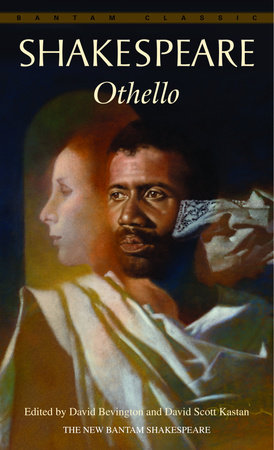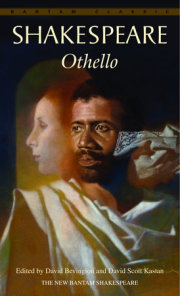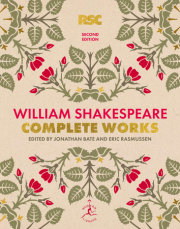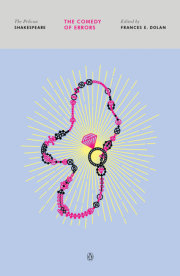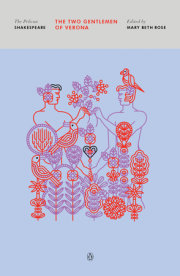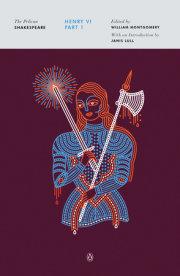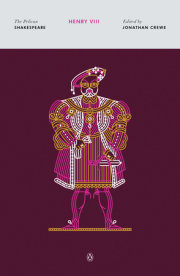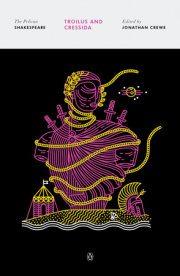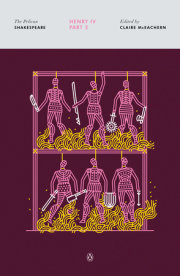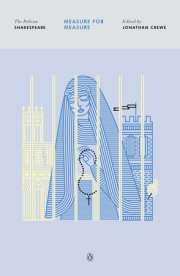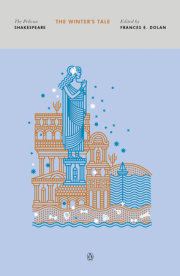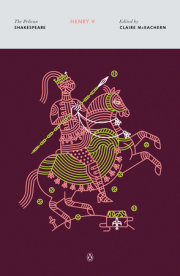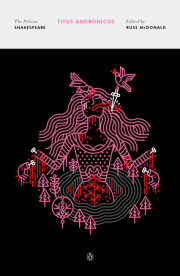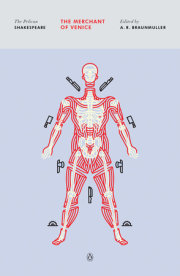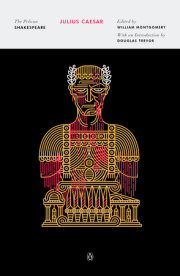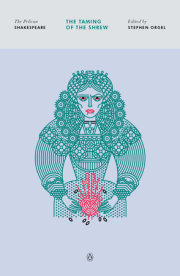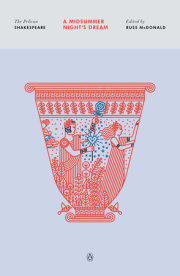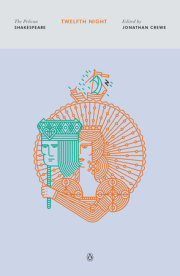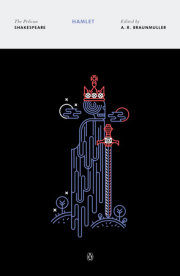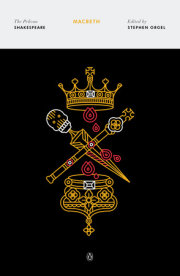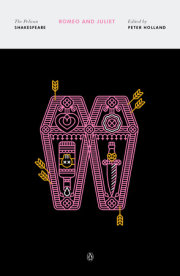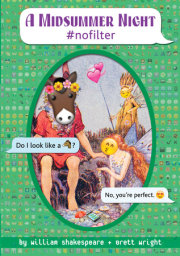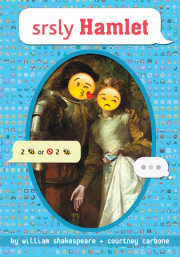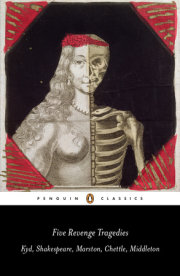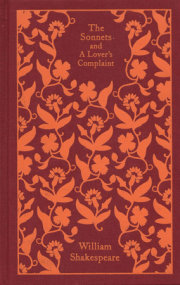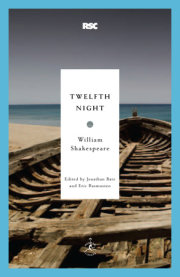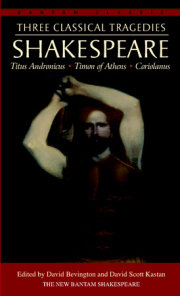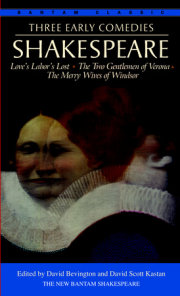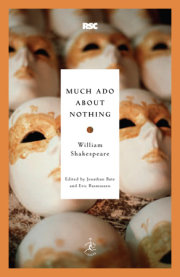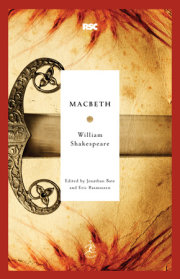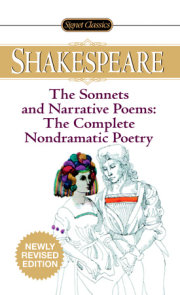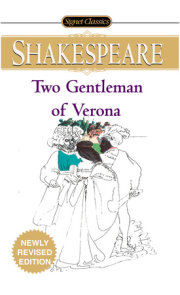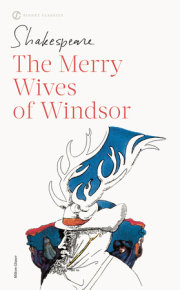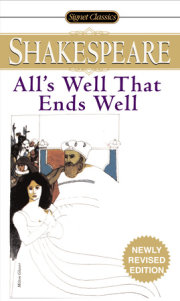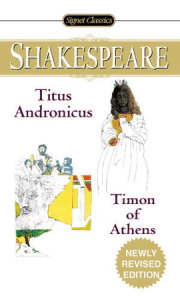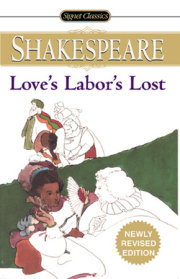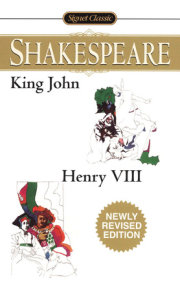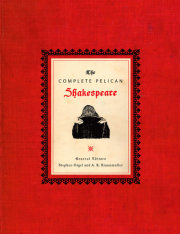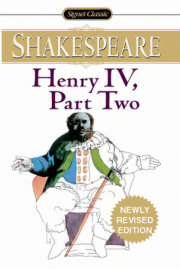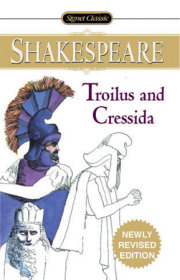The Names of the Actors
Othello, the Moor
Brabantio, [a senator,] father to Desdemona
Cassio, an honorable lieutenant [to Othello]
Iago, [Othello's ancient,] a villain
Roderigo, a gulled gentleman
Duke of Venice
Senators [of Venice]
Montano, Governor of Cyprus
Gentlemen of Cyprus
Lodovico and Gratiano, [kinsmen to Brabantio,] two
Noble Venetians
sailors
clown
Desdemona, [daughter to Brabantio and] wife to
Othello
Emilia, wife to Iago
Bianca, a courtesan [and mistress to Cassio]
[a messenger
a herald
a musician
Servants, Attendants, Officers, Senators,
Musicians, Gentlemen
scene: Venice; a seaport in Cyprus]
1.1 Location: Venice. A street.
1 never tell me (An expression of incredulity, like "tell me another one.")
3 this i.e., Desdemona's elopement.
4 'Blood By His (Christ's) blood
7 him Othello
14 Bombast circumstance wordy evasion. (Bombast is cotton padding.)
15 epithets of war military expressions
17 Nonsuits rejects the petition of. Certes Certainly
20 arithmetician i.e., a man whose military knowledge is merely theoretical, based on books of tactics
22 A . . . wife (Cassio does not seem to be married, but his counterpart in Shakespeare's source does have a woman in his house. See also 4.1.131.)
24 division of a battle disposition of a military unit
25 a spinster i.e., a housewife, one whose regular occupation is spinning. Theoric theory
26 Togaed consuls toga-wearing counselors or senators. propose discuss
1.1 A Enter Roderigo and Iago.
Roderigo
Tush, never tell me! I take it much unkindly 1
That thou, Iago, who hast had my purse
As if the strings were thine, shouldst know of this. 3
Iago 'Sblood, but you'll not hear me. 4
If ever I did dream of such a matter,
Abhor me.
Roderigo
Thou told'st me thou didst hold him in thy hate. 7
Iago Despise me
If I do not. Three great ones of the city,
In personal suit to make me his lieutenant,
Off-capped to him; and by the faith of man,
I know my price, I am worth no worse a place.
But he, as loving his own pride and purposes,
Evades them with a bombast circumstance 14
Horribly stuffed with epithets of war, 15
And, in conclusion,
Nonsuits my mediators. For, "Certes," says he, 17
"I have already chose my officer."
And what was he?
Forsooth, a great arithmetician, 20
One Michael Cassio, a Florentine,
A fellow almost damned in a fair wife, 22
That never set a squadron in the field
Nor the division of a battle knows 24
More than a spinster--unless the bookish theoric, 25
Wherein the Togaed consuls can propose 26
As masterly as he. Mere prattle without practice
Is all his soldiership. But he, sir, had th'election;
29 his Othello's
31 Beleed and calmed left to leeward without wind, becalmed. (A sailing metaphor.)
32 Debitor and Creditor (A name for a system of bookkeeping, here used as a contemptuous nickname for Cassio.) countercaster i.e., bookkeeper, one who tallies with counters, or "metal disks." (Said contemptuously.)
33 in good time opportunely, i.e., forsooth
34 God bless the mark (Perhaps originally a formula to ward off evil; here an expression of impatience.) ancient standard-bearer, ensign.
35 his hangman the executioner of him.
37 Preferment promotion. letter and affection personal influence and favoritism
38 old gradation step-by-step seniority, the traditional way
40 term respect. affined bound
43 content you don't you worry about that.
46 truly faithfully
50 cashiered dismissed from service.
51 Whip me Whip, as far as I'm concerned
52 trimmed . . . duty dressed up in the mere form and show of dutifulness
55 lined their coats i.e., stuffed their purses
56 Do themselves homage i.e., attend to self-interest solely.
And I, of whom his eyes had seen the proof 29
At Rhodes, at Cyprus, and on other grounds
Christened and heathen, must be beleed and calmed 31
By debitor and creditor. This countercaster, 32
He, in good time, must his lieutenant be, 33
And I--God bless the mark!--His Moorship's ancient. 34
Roderigo
By heaven, I rather would have been his hangman. 35
Iago
Why, there's no remedy. 'Tis the curse of service;
Preferment goes by letter and affection, 37
And not by old gradation, where each second 38
Stood heir to th' first. Now, sir, be judge yourself
Whether I in any just term am affined 40
To love the Moor.
Roderigo I would not follow him then.
Iago Oh, sir, content you. 43
I follow him to serve my turn upon him.
We cannot all be masters, nor all masters
Cannot be truly followed. You shall mark 46
Many a duteous and knee-crooking knave
That, doting on his own obsequious bondage,
Wears out his time, much like his master's ass,
For naught but provender, and when he's old,
cashiered. 50
Whip me such honest knaves. Others there are 51
Who, trimmed in forms and visages of duty, 52
Keep yet their hearts attending on themselves,
And, throwing but shows of service on their lords,
Do well thrive by them, and when they have lined
their coats, 55
Do themselves homage. These fellows have some
soul, 56
59 Were . . . Iago i.e., if I were able to assume command, I certainly would not choose to remain a subordinate, or, I would keep a suspicious eye on a flattering subordinate.
62 peculiar particular, personal
64 native innate. figure shape, intent
65 compliment extern outward show (conforming in this case to the inner workings and intention of the heart)
67 Daws small crowlike birds, proverbially stupid and avaricious. I am not what I am i.e., I am not one who wears his heart on his sleeve.
68 full swelling. thick-lips (Elizabethans often applied the term "Moor" to Negroes.) owe own
69 Carry't thus carry this off.
72-3 though . . . flies though he seems prosperous and happy now, vex him with misery.
73 Though . . . be joy Although he seems fortunate and happy. (Repeats the idea of line 72.)
74 changes of vexation vexing changes
75 As . . . color that may cause it to lose some of its first gloss.
77 timorous frightening
78 As . . . fire as when a fire, having gained hold by negligence at night
83.1 at a window (This stage direction, from the quarto, probably calls for an appearance on the gallery above and rearstage.)
And such a one do I profess myself. For, sir,
It is as sure as you are Roderigo,
Were I the Moor I would not be Iago. 59
In following him, I follow but myself--
Heaven is my judge, not I for love and duty,
But seeming so for my peculiar end. 62
For when my outward action doth demonstrate
The native act and figure of my heart 64
In compliment extern, 'tis not long after 65
But I will wear my heart upon my sleeve
For daws to peck at. I am not what I am. 67
Roderigo
What a full fortune does the thick-lips owe 68
If he can carry't thus!
Iago Call up her father. 69
Rouse him, make after him, poison his delight,
Proclaim him in the streets; incense her kinsmen,
And, though he in a fertile climate dwell, 72
Plague him with flies. Though that his joy be joy, 73
Yet throw such changes of vexation on't 74
As it may lose some color. 75
Roderigo
Here is her father's house. I'll call aloud.
Iago
Do, with like timorous accent and dire yell 77
As when, by night and negligence, the fire 78
Is spied in populous cities.
Roderigo
What ho, Brabantio! Signor Brabantio, ho!
Iago
Awake! What ho, Brabantio! Thieves, thieves, thieves!
Look to your house, your daughter, and your bags!
Thieves, thieves! 83
Brabantio [enters] above [at a window].
88 Zounds By His (Christ's) wounds
91 Tupping covering, copulating with. (Said of sheep.)
92 snorting snoring
93 the devil (The devil was conventionally pictured as black.)
102 distemp'ring intoxicating
103 Upon malicious bravery with hostile intent to defy me
104 start startle, disrupt
Brabantio
What is the reason of this terrible summons?
What is the matter there?
Roderigo
Signor, is all your family within?
Iago
Are your doors locked?
Brabantio Why, wherefore ask you this?
Iago
Zounds, sir, you're robbed. For shame, put on your
gown! 88
Your heart is burst; you have lost half your soul.
Even now, now, very now, an old black ram
Is Tupping your white ewe. Arise, arise! 91
Awake the snorting citizens with the bell, 92
Or else the devil will make a grandsire of you. 93
Arise, I say!
Brabantio What, have you lost your wits?
Roderigo
Most reverend signor, do you know my voice?
Brabantio Not I. What are you?
Roderigo My name is Roderigo.
Brabantio The worser welcome.
I have charged thee not to haunt about my doors.
In honest plainness thou hast heard me say
My daughter is not for thee; and now, in madness,
Being full of supper and distemp'ring drafts, 102
Upon malicious bravery dost thou come 103
To start my quiet. 104
Roderigo
Sir, sir, sir--
Brabantio But thou must needs be sure
106 My . . . power my temperament and my authority of office have it in their power
109 grange isolated country house.
110 simple sincere
114 Barbary from northern Africa (and hence associated with Othello)
115 nephews i.e., grandsons
115-16 you'll . . . Germans you'll consent to have powerful horses for kinfolks and small Spanish horses for near relatives.
121 a senator (Said with mock politeness, as though the word itself were an insult.)
122 Answer be held accountable for.
124 wise well-informed
126 At . . . night at this hour that is between day and night, neither the one nor the other
127 with by
128 But with a knave than by a low fellow, a servant
130 and your allowance and has your permission
131 saucy insolent
My spirits and my place have in their power 106
To make this bitter to thee.
Roderigo Patience, good sir.
Brabantio
What tell'st thou me of robbing? This is Venice;
My house is not a grange.
Roderigo Most grave Brabantio, 109
In simple and pure soul I come to you. 110
Iago Zounds, sir, you are one of those that will not
serve God if the devil bid you. Because we come to do
you service and you think we are ruffians, you'll have
your daughter covered with a Barbary horse; you'll 114
have your nephews neigh to you; you'll have coursers 115
for cousins and jennets for germans. 116
Brabantio What profane wretch art thou?
Iago I am one, sir, that comes to tell you your daughter
and the Moor are now making the beast with two
backs.
Brabantio
Thou art a villain.
Iago You are--a senator. 121
Brabantio
This thou shalt answer. I know thee, Roderigo. 122
Roderigo
Sir, I will answer anything. But I beseech you,
If't be your pleasure and most wise consent-- 124
As partly I find it is--that your fair daughter,
At this odd-even and dull watch o'th' night, 126
Transported with no worse nor better guard 127
But with a knave of common hire, a gondolier, 128
To the gross clasps of a lascivious Moor--
If this be known to you and your allowance 130
We then have done you bold and saucy wrongs. 131
But if you know not this, my manners tell me
134 from contrary to. civility good manners, decency
135 your reverence (1) the respect due to you (2) Your Reverence.
138 wit intelligence
139-40 In . . . everywhere to a wandering and vagabond foreigner of uncertain origins.
140 Straight Straightaway
144 tinder charred linen ignited by a spark from flint and steel, used to light torches or tapers (lines 145, 170)
146 accident occurrence, event
149 meet fitting. place position (as ensign)
150 producted produced (as a witness)
152 gall rub; oppress. check rebuke
153 cast dismiss. embarked engaged
154 loud urgent
155 stands in act have started. for their souls to save their souls
156 fathom i.e., ability, depth of experience
157 in which regard out of regard for which
159 life livelihood
162 Sagittary (An inn or house where Othello and Desdemona are staying, named for its sign of Sagittarius, or Centaur.) raised search search party roused out of sleep
163.1 nightgown dressing gown. (This costuming is specified in the quarto text.)
We have your wrong rebuke. Do not believe
That, from the sense of all civility, 134
I thus would play and trifle with your reverence. 135
Your daughter, if you have not given her leave,
I say again, hath made a gross revolt,
Tying her duty, beauty, wit, and fortunes 138
In an extravagant and wheeling stranger 139
Of here and everywhere. Straight satisfy yourself. 140
If she be in her chamber or your house,
Let loose on me the justice of the state
For thus deluding you.
Brabantio [calling] Strike on the tinder, ho! 144
Give me a taper! Call up all my people!
This accident is not unlike my dream. 146
Belief of it oppresses me already.
Light, I say, light! Exit [above].
Iago Farewell, for I must leave you.
It seems not meet nor wholesome to my place 149
To be producted--as, if I stay, I shall-- 150
Against the Moor. For I do know the state,
However this may gall him with some check, 152
Cannot with safety cast him, for he's embarked 153
With such loud reason to the Cyprus wars, 154
Which even now stands in act, that, for their souls, 155
Another of his fathom they have none 156
To lead their business; in which regard, 157
Though I do hate him as I do hell pains,
Yet for necessity of present life 159
I must show out a flag and sign of love,
Which is indeed but sign. That you shall surely find
him,
Lead to the Sagittary the raised search, 162
And there will I be with him. So farewell. Exit. 163
Enter [below] Brabantio [in his nightgown] with servants and torches.
165 time i.e., remainder of life
175 charms spells
176 property special quality, nature
177 abused deceived.
182 discover reveal, uncover
185 command demand assistance
187 deserve show gratitude for
Brabantio
It is too true an evil. Gone she is;
And what's to come of my despised time 165
Is naught but bitterness. Now, Roderigo,
Where didst thou see her?--Oh, unhappy girl!--
With the Moor, say'st thou?--Who would be a father!--
How didst thou know 'twas she?--Oh, she deceives
me
Past thought!--What said she to you?--Get more
tapers.
Raise all my kindred.--Are they married, think you?
Roderigo Truly, I think they are.
Brabantio
Oh, heaven! How got she out? Oh, treason of the
blood!
Fathers, from hence trust not your daughters' minds
By what you see them act. Is there not charms 175
By which the property of youth and maidhood 176
May be abused? Have you not read, Roderigo, 177
Of some such thing?
Roderigo Yes, sir, I have indeed.
Brabantio
Call up my brother.--Oh, would you had had her!--
Some one way, some another.--Do you know
Where we may apprehend her and the Moor?
Roderigo
I think I can discover him, if you please 182
To get good guard and go along with me.
Brabantio
Pray you, lead on. At every house I'll call;
I may command at most.--Get weapons, ho! 185
And raise some special officers of night.--
On, good Roderigo. I will deserve your pains. 187
Exeunt.
Copyright © 1988 by William Shakespeare. All rights reserved. No part of this excerpt may be reproduced or reprinted without permission in writing from the publisher.

